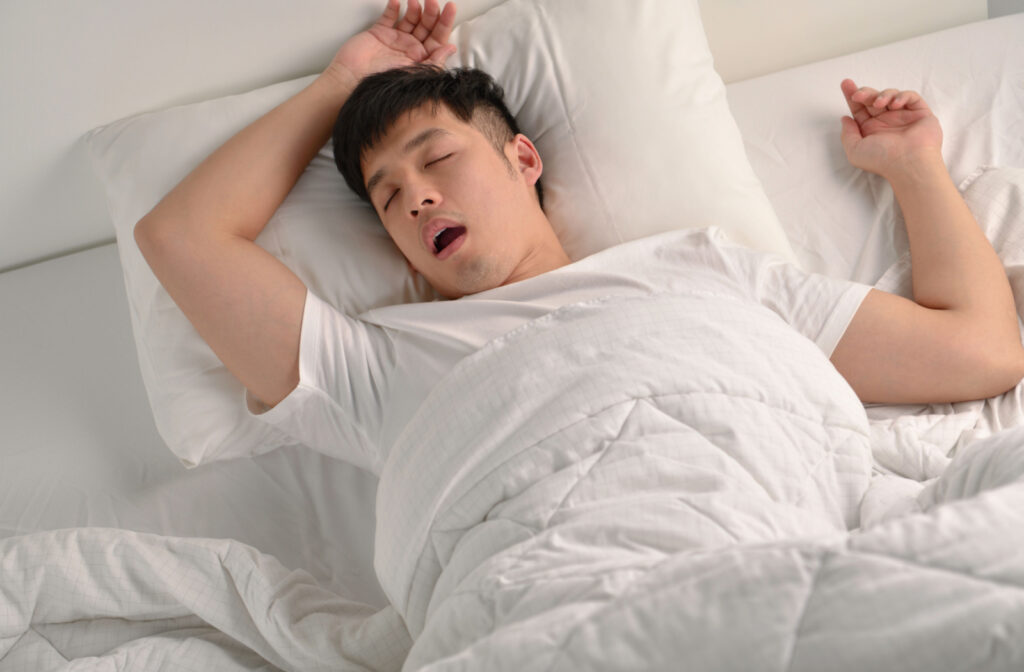When you find it hard to get a good night’s sleep or feel fatigued and irritable despite sleeping for the recommended number of hours, you might be experiencing sleep apnea.
Sleep apnea is a sleep disorder that can affect your breathing while you sleep. Snoring is often a symptom of sleep apnea, but it’s not the only symptom and may not be one you experience. So, it can be a common misconception that snoring is an obvious sign or perhaps the only sign of sleep apnea.
Sleep apnea is more than just something that may keep your partner awake at night or prevent you from getting a good night’s rest. It can be a sign of other issues, like TMJ disorder, and can lead to issues with your overall oral health and dental hygiene if left untreated.
What Is Sleep Apnea?
Sleep apnea is a sleep disorder that often causes temporary pauses in breathing while you sleep. These pauses can last between 10 and 30 seconds and can occur up to hundreds of times while you sleep. The breathing pauses caused by sleep apnea can also cause a decrease in oxygen levels in the body, causing the brain to wake you and disrupt your sleep cycle.
What Are the Different Types of Sleep Apnea?
There are 3 types of sleep apnea: obstructive sleep apnea (OSA), central sleep apnea (CSA), and complex sleep apnea syndrome (CompSAS).
Obstructive Sleep Apnea (OSA)
OSA is the most common type of sleep apnea. It occurs when the muscles in the back of your throat relax, leading to blocked airways, making breathing difficult. This form of sleep apnea is a significant reason many people believe that snoring is a sign of sleep apnea—because snoring is a common symptom of OSA.
Central Sleep Apnea (CSA)
CSA is a less common type of sleep apnea that typically occurs when the brain fails to send the proper signals to the muscles that control breathing. Diseases like Parkinson’s disease, chronic heart failure, or stroke are all commonly associated with CSA, along with certain medications, such as opioids or benzodiazepines.
Complex Sleep Apnea Syndrome (CompSAS)
CompSAS has been more recently identified by researchers. Individuals with CompSAS may appear to have OSA initially but don’t respond fully to typical treatment like a CPAP machine. So, CompSAS ends up being a combination of both CSA and OSA.
Symptoms of Sleep Apnea
Other common sleep apnea symptoms, apart from snoring, include:
- Excessive daytime sleepiness
- Trouble concentrating
- Morning headaches
- A sore throat
- Dry mouth
- Irritability
- Silent breathing pauses while asleep
- Choking and gasping while asleep
If you notice any of these symptoms, consider speaking with your dentist or another healthcare professional. We can examine your oral health to confirm or rule out sleep apnea.
How Can You Identify Sleep Apnea Without Snoring?
While snoring is a common symptom of sleep apnea, it’s not a prerequisite for the condition. Some individuals who suffer from sleep apnea might not snore at all. However, they may still experience other symptoms, like choking, gasping, or silent breathing pauses.
A thorough oral health examination and specialized testing can provide a clear diagnosis for sleep apnea when you notice common symptoms other than snoring.
Sleep Apnea Management & Treatment
The treatment for sleep apnea often depends on the underlying cause and severity of your symptoms. One common treatment for OSA involves using a continuous positive airway pressure (CPAP) machine that delivers air pressure to keep your airways open while you sleep.
Other treatments can include behavioural therapy, surgery, or a change in lifestyle habits like losing weight, avoiding alcohol and smoking, and sleeping on your side rather than your back.
If the root of your sleep apnea is another oral health issue—such as TMJ disorder, for example—we may be able to offer other forms of sleep apnea treatment, such as oral appliances, orthodontics, or specific techniques to help relax your jaws.
How Does Sleep Apnea Affect Oral Health?
Sleep apnea isn’t a condition that only affects your sleep. It can actually affect your overall oral health as well. TMJ commonly accompanies sleep apnea. And mouth breathing is also common for those dealing with sleep apnea.
When you breathe through an open mouth due to a condition like sleep apnea, the result can be an increased risk of gum disease or tooth decay because of the changes in the bacterial growth in your mouth.
In addition to the potential for increased bacteria growth, dry mouth from mouth breathing can also increase your risk of chronic bad breath, sores on your lips, tongue, or mouth, and taste disorders.

Discuss Sleep Apnea Treatment with Your Dentist
Yes, snoring is a common symptom of sleep apnea, but it’s not a definitive indicator of the condition. You should consult a healthcare professional if you experience any of the sleep apnea symptoms discussed above.
Early diagnosis and treatment of sleep apnea can improve your sleep quality, reduce daytime fatigue, and improve your overall quality of life. So, it’s important to prioritize your sleep health and seek medical help if you suspect you may have sleep apnea.
You may not immediately associate a visit to your dentist with finding a solution to sleep apnea, but we are equipped to offer several effective solutions for sleep apnea symptoms. Give us a call at Genesis Dental today and book an appointment. Let our experienced team go through your options to help you get the rest you need.




